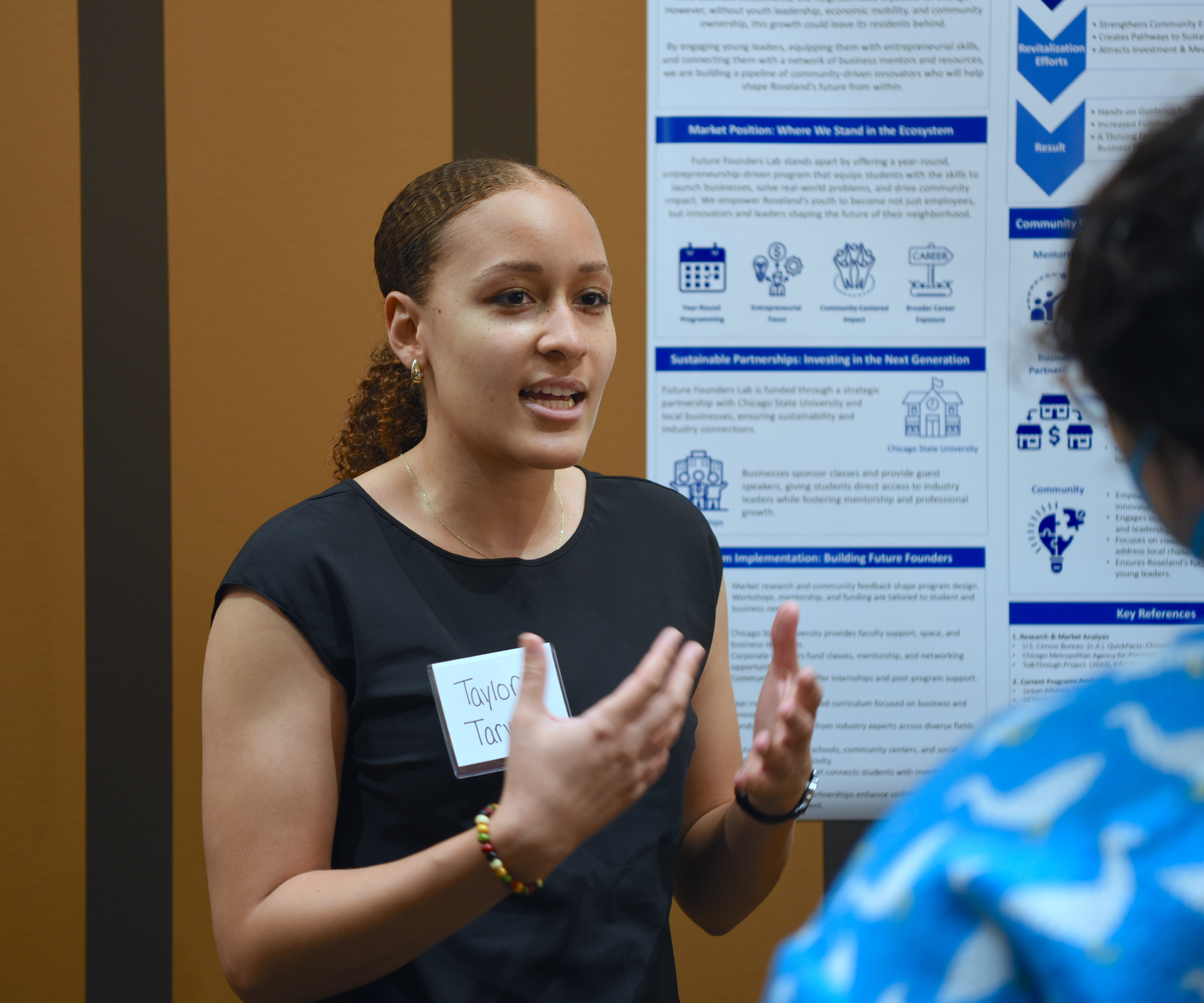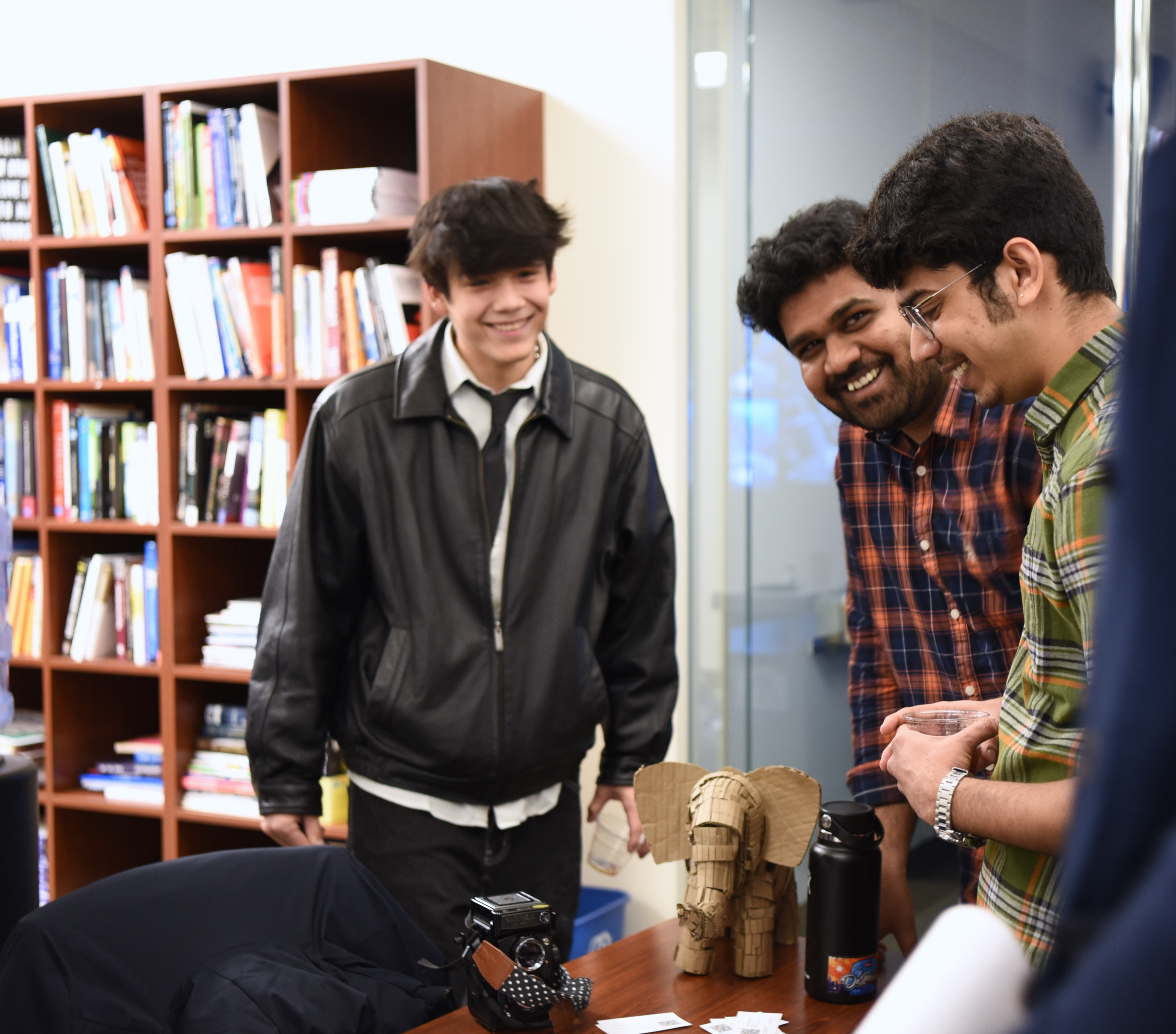 Entrepreneurship staff and students celebrate at the annual Student Innovation Expo: a showcase for the best of student entrepreneurship at DePaul.
Entrepreneurship staff and students celebrate at the annual Student Innovation Expo: a showcase for the best of student entrepreneurship at DePaul.Entrepreneurship at DePaul's Driehaus College of Business continues to garner nationwide recognition.
The Princeton Review has ranked the college's undergraduate entrepreneurship program at #15 on its global list of business schools. The college's graduate entrepreneurship program ranked sixteenth. Both programs are leaders in the Midwest, ranking sixth (undergraduate) and fifth (graduate) in the region.
Additionally, Poets&Quants identified the DePaul MBA program among a selective list of top MBAs for entrepreneurs.
Dean of the Driehaus College of Business Sulin Ba attributes the college’s continued excellence to the college’s urban roots and innovative curriculum.
“Our location in the heart of Chicago and our robust alumni network connect Driehaus to a thriving entrepreneurial ecosystem,” she said. “More than that, the entrepreneurial spirit suffuses how we think about business education. Paired with our deep connections to the city, our innovative curriculum ensures that students don’t just learn through real-world experience — they also make a difference.”
Entrepreneurship drives innovation in curriculum
 A DePaul MBA student pitches the project her team completed in partnership with the CTA. Future MBA cohorts will get similar real-world experiences as part of the program's capstone class.
A DePaul MBA student pitches the project her team completed in partnership with the CTA. Future MBA cohorts will get similar real-world experiences as part of the program's capstone class. Entrepreneurship is deeply embedded in the DePaul business curriculum.
The college’s introductory entrepreneurship course, MGT 270, serves a wide variety of students from across the university. Future freelance artists learn critical business skills; students with side hustles learn how to take their work to the next level. DePaul’s School of Music even requires the course for Performing Arts Management majors: a testament to the value of entrepreneurial skills for students across career paths.
Within the College of Business, meanwhile, entrepreneurship isn’t just a foundational skill for students. It’s also a guiding ethos for curricular innovation.
The
award-winning Driehaus Cup competition is part of the college's revised core curriculum, which
debuted in fall 2022. First-year business students work together in teams to develop original business ideas. Select teams pitch their ideas to a panel of industry professionals, with scholarship money at stake. All students get introduced to business fundamentals through the eyes of an entrepreneur.
The DePaul MBA, meanwhile, culminates in an entrepreneurship-focused capstone. Working in teams, students might either pitch original business ideas or work with Chicago-based companies and nonprofits to develop innovative proposals. Either way, students gain essential tools to develop, refine, and execute visionary ideas.
The capstone class made its unofficial debut in Winter Quarter 2025, when
MBA students partnered with the CTA. That project involved developing visions for how entrepreneurship, paired with infrastructure investment, could catalyze economic development in the city’s Greater Roseland community.
Entrepreneurship center connects college to thriving entrepreneurial ecosystem
 Student-entrepreneurs connect at the annual Student Innovation Expo
Student-entrepreneurs connect at the annual Student Innovation ExpoDePaul also houses the Coleman Entrepreneurship Center, a longstanding hub for entrepreneurial activity in Chicago.
The center’s programming ranges from “Startup 101” primers to pitch competitions with thousands of dollars in prize money at stake. Competitions like Purpose Pitch reward entrepreneurs, students and community members whose projects advance social good. Events like University Pitch Madness bring together student entrepreneurs from leading colleges across the Midwest for a day of competition and networking.
The Coleman Center connects students to entrepreneurial activity across Chicago — and the country. Through the center’s internship program, students get invaluable
experience working at early-stage ventures. Memberships in entrepreneurial hubs like
TechNexus grant students access to a network of cutting-edge entrepreneurs.
The Coleman Center is also home to the $2.7 million Halperin Emerging Company Fund. The venture fund backs high-potential startups that are either founded by DePaul community members or advance DePaul’s values. The Halperin Fund gives students unique insight into the often-opaque venture funding process; three students sit on its Investment Committee each year. Recent investments include an AI-powered investment firm, an artisan granola bar maker, and a visual display company. Thanks to this unique program, students and alumni not only get an investment from DePaul. They also get connected to the DePaul startup ecosystem to propel them even further.
A legacy of student and alumni success
 Thulasi Karuppiah, a graduate of DePaul's MS in Audit and Advisory program, celebrates her regional win in the Startup World Cup.
Thulasi Karuppiah, a graduate of DePaul's MS in Audit and Advisory program, celebrates her regional win in the Startup World Cup.DePaul students and alumni have recently made headlines for their accomplishments as entrepreneurs.
Student Eddie Favela’s line of bottled aguas frescas began in his Lincoln Park apartment. Now, the DePaul senior has sold more than 125,000 bottles, which are on store shelves across a dozen states. In a
recent Block Club Chicago article, Favela credits his success to the support he has received from DePaul business faculty.
DePaul M.S. in Audit and Advisory Services alumna Thulasi Karuppiah, meanwhile, recently
placed as a finalist in the Startup World Cup, a global competition with $1 million of prize money at stake. Karuppiah developed and launched her business, KR Scrap Exports, as a student at DePaul, where she won the audience choice award at the Coleman Center’s Purpose Pitch competition.
Favela and Karuppiah are just the latest in a long line of DePaul entrepreneurs to make their mark on business — and inspire the next generation of entrepreneurs in turn. In many ways, their stories exemplify what makes entrepreneurship at DePaul special. Both student-entrepreneurs have deep roots in their respective communities; their ventures reflect their identities, their experiences, and their commitment to making a difference. For both students, as for many other DePaul entrepreneurs, entrepreneurship isn't just about individual success. It's about harnessing business acumen to drive positive change.